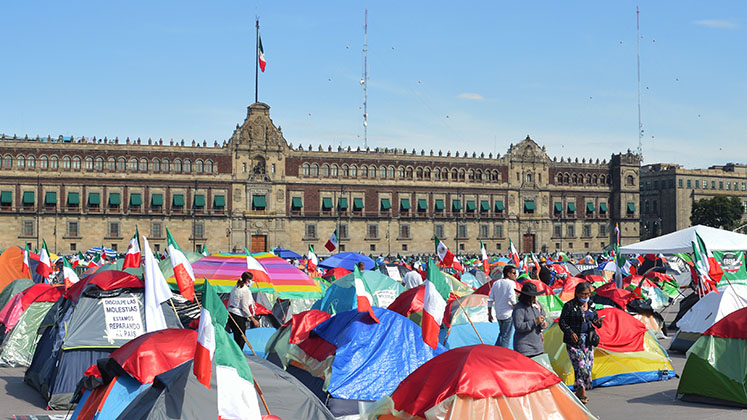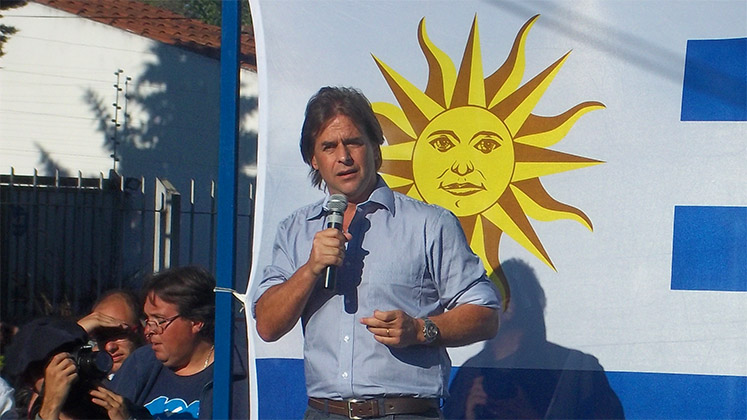Colombian President Gustavo Petro will mark his first year in office in August 2023. A former guerrilla member, Petro was elected under the promise to radically transform the structures of violence and inequality in Colombia. This ambitious agenda included introducing reforms in the country’s education, labour, pensions, land, health, and tax systems, alongside a comprehensive peace policy. Mario Carvajal (London School of Economics), Álvaro Llano (SciencesPo Paris) and Alejandro Posada-Téllez (University of Oxford) explore some of the features that have defined Petro’s first year in office, focusing on his proposed reforms, bureaucratic choices, and communication style.
After taking power, President Gustavo Petro has been delivering a series of reto promoting the transformative agenda he advocated during his political campaign. Initially, he enjoyed a favourable political environment, with solid legislative backing and high approval ratings. Nonetheless, this honeymoon period was short-lived, and Petro now faces challenges from all sides. According to a recent survey, the president’s approval rating dropped by more than 21% between September 2022 and June 2023.
The governing alliance he initially consolidated has also run into problems. Several coalition parties have distanced themselves from the president, and Petro no longer enjoys an absolute majority in any of the two chambers. This has challenged the president’s ability to enact his ambitious legislative agenda. Only his tax proposal has become law out of the five major reforms brought to Congress. The other reforms introduced, namely health, pension, and labour, are stalled in Congress, while the ambitious ‘Total Peace’ agenda is faltering. The current legislative climate is likely to continue playing against the president’s interests for the remainder of his term.
With a weak coalition and low approval ratings, President Petro has decided to change his strategy and take his proposals to the streets. In a speech delivered to hundreds of supporters on Labour Day 2023, Petro warned that attempts to restrict his reforms could lead to a revolution. He also called on his supporters to “take the debate to the streets” to pressure Colombia’s institutions to embrace his reforms.
One year into his term, Petro’s conciliatory and unifying discourse has transformed into confrontation and popular mobilisation in favour of his proposals. The president replaced seven of his 19 cabinet ministers, some of whom represented centre-right and more moderate sectors. Furthermore, an alleged scandal within the government involving two former government aides, including the former ambassador to Venezuela, threatens to further undermine Petro’s political agenda and popularity during the remainder of his term.
Petro’s bureaucratic aversion
During the presidential campaign, Petro promised to professionalise Colombia’s bureaucratic system to end the use of public office to pay political favours. He emphasised the foreign policy sector, which has traditionally been used as a bounty for political hacks. One year on, however, the president has failed to keep these promises and has continued to appoint political hacks to diplomatic posts, regardless of experience or diplomatic expertise.
Petro’s predecessor, Iván Duque, named 16 ambassadors during his first year in office, and only one was a career diplomat. Duque also appointed ten consuls, of which only four were career diplomats. This was heavily criticised by then-Senator and presidential candidate Gustavo Petro, who promised that at least half of the foreign policy bureaucracy would be made up of seasoned career diplomats in his government.
However, of the 23 ambassadors appointed in his first five months in office, only six were career diplomats. The remaining number are close allies of the president, such as Moises Ninco Daza, the ambassador to Mexico. Ninco Daza served as community manager for Gustavo Bolívar, a close ally of Petro, and does not have a bachelor’s degree, let alone diplomatic experience. Curiously, Ninco Daza presented his participation in a Model United Nations conference as proof of his aptness for the role, which Foreign Minister Álvaro Leyva approved.
Beyond foreign policy choices, Petro has openly questioned experienced bureaucratic leadership, arguing that there is no one form of knowledge and that “it’s not about names or titles”. For Petro, professional experience is not necessary for senior government positions, such as the Ministry of Mines, led by Irene Velez, a philosopher and geographer with no experience in the mining sector. According to political scientist Juan David Velazco, Petro’s revolutionary nature demands fast changes, but experienced technocrats often favour gradual change. Additionally, Petro has openly stated that he believes that the greatest obstacle against his agenda for change comes within his government, a possible jab to the technocrats and bureaucrats within his administration. This mistrust of technocracy, and his revolutionary impetus, will likely cause tensions within his administration in the future.
“Twittercracy”?
The final defining feature of this first year in office, and which will likely continue to be a central tenet of Gustavo Petro’s presidency, is his communication style. Even before he came to power, he has been an avid Twitter user and he considers the platform as an instrument of governance as much as communication. He was recently recognised by the BCW Twiplomacy 2022 Ranking as the fourth most influential world leader on Twitter, Tweeting an average of 13 to 15 times a day to his 6.5 million followers on both government affairs and personal views.
The president’s failure to separate his personal and institutional communications has, however, created a series of problems for his administration. His Twitter activity has added significant volatility to Colombian markets, according to a JP Morgan report issued in October 2022. The report highlights that those tweets have threatened the existing fiscal rule and created confusion around the possibility of establishing capital controls.
This communication strategy also undermined Petro’s proposed reforms. On December 31st, 2022, the president announced on Twitter that he had reached a ceasefire agreement with five of the country’s illegal armed groups, including the National Liberation Army (ELN). Though this was a promising start to his flagship policy of ‘Total Peace’, the ELN issued a statement shortly after refuting Petro’s claim while rejecting the government’s unilateral decree. After an extraordinary cabinet meeting, the ceasefire decree with the ELN was suspended.
Petro has similarly shown a preference for Twitter over institutional channels of governance. To illustrate, the Peruvian government withdrew its ambassador to Colombia in March 2023, arguing that Petro was interfering in Perú’s democratic processes after the president repeatedly tweeted in support of former president Pedro Castillo. Likewise, Petro has on two occasions engaged in a Twitter feud with Salvadoran president Nayib Bukele, who accused Petro of “attacking” not only himself but also the internal affairs of El Salvador. In both of these episodes, the president’s impulse to express personal opinions caused him to bypass traditional diplomatic channels, with important implications for Colombia’s foreign policy.
Gustavo Petro’s presidency has been marked by his communication strategy, bureaucratic decisions, and efforts to promote his agenda of change. However, his willingness to change structural problems in Colombia has been hindered by a decline in his popularity, the fragmentation within his government coalition, and a communication style that has undermined Petro’s proposed reforms.
With over three years remaining in his term, President Petro will have to correct what has so far prevented him from moving his agenda forward to deliver on the promises of transforming healthcare, education, pensions, and other key sectors that brought him to Colombia’s highest public position.
Notes:
• The views expressed here are of the author rather than the Centre or the LSE
• Please read our Comments Policy before commenting
• Banner image: Portrait of Gustavo Petro Urrego, Colombia’s President / Arturo Larrahondo (Shutterstock)





